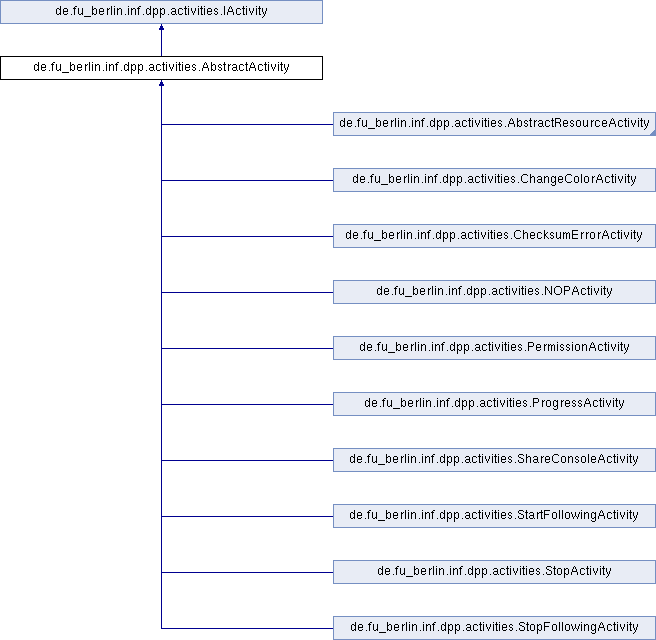 |
Saros
Distributed Collaborative Editing and Distributed Party Programming
|
 |
Saros
Distributed Collaborative Editing and Distributed Party Programming
|

Public Member Functions | |
| AbstractActivity (User source) | |
| boolean | isValid () |
| User | getSource () |
| int | hashCode () |
| boolean | equals (Object obj) |
| de.fu_berlin.inf.dpp.activities.AbstractActivity.AbstractActivity | ( | User | source | ) |
2, Creating a new Activity type, The abstract class to extend:
Instead of directly implementing IActivity, any new activity type should extends this class.
However, there is an important subtype of activities: An activity that refers to a resource, such as a file, should implement the more specialized IResourceActivity interface. And guess what, there is an abstract class for this interface, too: AbstractResourceActivity.
So once you decided which of these two abstract classes to extend, you can provide your new class with all fields and methods you deem necessary, and then continue with the next stop.
| source | Must not be null |
| boolean de.fu_berlin.inf.dpp.activities.AbstractActivity.equals | ( | Object | obj | ) |
Reimplemented in de.fu_berlin.inf.dpp.activities.AbstractResourceActivity, de.fu_berlin.inf.dpp.activities.ChecksumActivity, de.fu_berlin.inf.dpp.activities.ChecksumErrorActivity, de.fu_berlin.inf.dpp.activities.EditorActivity, de.fu_berlin.inf.dpp.activities.FileActivity, de.fu_berlin.inf.dpp.activities.FolderActivity, de.fu_berlin.inf.dpp.activities.JupiterActivity, de.fu_berlin.inf.dpp.activities.PermissionActivity, de.fu_berlin.inf.dpp.activities.ProgressActivity, de.fu_berlin.inf.dpp.activities.StopActivity, de.fu_berlin.inf.dpp.activities.TextEditActivity, de.fu_berlin.inf.dpp.activities.TextSelectionActivity, de.fu_berlin.inf.dpp.activities.VCSActivity, and de.fu_berlin.inf.dpp.activities.ViewportActivity.
| User de.fu_berlin.inf.dpp.activities.AbstractActivity.getSource | ( | ) |
1, Creating a new Activity type, The IActivity interface:
This tour explains what you need to consider when you want to create a new Activity type.
IActivity is the base interface for all activity implementations. The only common attribute of all IActivity instances is the source, that is the session participant who did "something" and therefore caused this activity in the first place.
So create a new class in the "activities" package with the suffix "Activity", and continue with the next stop. 3, Some Basics:
When a session has begun, messages are passed between all participants to keep the session synchronized. The messages are known as Activities and come in different types. Each type inherits from this interface and implements its specific behavior.
Handling of Activities is done using the Inversion of Control pattern. Returns the user who caused this activity.
null Implements de.fu_berlin.inf.dpp.activities.IActivity.
| int de.fu_berlin.inf.dpp.activities.AbstractActivity.hashCode | ( | ) |
Reimplemented in de.fu_berlin.inf.dpp.activities.AbstractResourceActivity, de.fu_berlin.inf.dpp.activities.ChecksumActivity, de.fu_berlin.inf.dpp.activities.ChecksumErrorActivity, de.fu_berlin.inf.dpp.activities.EditorActivity, de.fu_berlin.inf.dpp.activities.FileActivity, de.fu_berlin.inf.dpp.activities.FolderActivity, de.fu_berlin.inf.dpp.activities.JupiterActivity, de.fu_berlin.inf.dpp.activities.PermissionActivity, de.fu_berlin.inf.dpp.activities.ProgressActivity, de.fu_berlin.inf.dpp.activities.StopActivity, de.fu_berlin.inf.dpp.activities.TextEditActivity, de.fu_berlin.inf.dpp.activities.TextSelectionActivity, de.fu_berlin.inf.dpp.activities.VCSActivity, and de.fu_berlin.inf.dpp.activities.ViewportActivity.
| boolean de.fu_berlin.inf.dpp.activities.AbstractActivity.isValid | ( | ) |
Reimplemented in de.fu_berlin.inf.dpp.activities.AbstractResourceActivity, de.fu_berlin.inf.dpp.activities.ChangeColorActivity, de.fu_berlin.inf.dpp.activities.ChecksumErrorActivity, de.fu_berlin.inf.dpp.activities.EditorActivity, de.fu_berlin.inf.dpp.activities.FileActivity, de.fu_berlin.inf.dpp.activities.NOPActivity, de.fu_berlin.inf.dpp.activities.PermissionActivity, de.fu_berlin.inf.dpp.activities.ProgressActivity, de.fu_berlin.inf.dpp.activities.RecoveryFileActivity, de.fu_berlin.inf.dpp.activities.StartFollowingActivity, de.fu_berlin.inf.dpp.activities.StopActivity, de.fu_berlin.inf.dpp.activities.TextSelectionActivity, and de.fu_berlin.inf.dpp.activities.ViewportActivity.